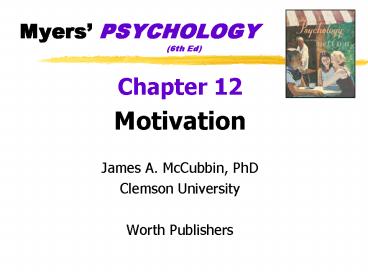Myers - PowerPoint PPT Presentation
1 / 25
Title:
Myers
Description:
Myers PSYCHOLOGY (6th Ed) Chapter 12 Motivation James A. McCubbin, PhD Clemson University Worth Publishers Motivation Motivation a need or desire that energizes ... – PowerPoint PPT presentation
Number of Views:37
Avg rating:3.0/5.0
Title: Myers
1
Myers PSYCHOLOGY (6th Ed)
- Chapter 12
- Motivation
- James A. McCubbin, PhD
- Clemson University
- Worth Publishers
2
Motivation
- Motivation
- a need or desire that energizes and directs
behavior - Instinct
- complex behavior that is rigidly patterned
throughout a species and is unlearned
3
Motivation
- Drive-Reduction Theory
- the idea that a physiological need creates an
aroused tension state (a drive) that motivates an
organism to satisfy the need
4
Motivation
- Homeostasis
- tendency to maintain a balanced or constant
internal state - regulation of any aspect of body chemistry around
a particular level - Incentive
- a positive or negative environmental stimulus
that motivates behavior
5
Maslows Hierarchy of Needs
Self-actualization needs Need to live up to ones
fullest and unique potential
- begins at the base with physiological needs that
must first be satisfied - then higher-level safety needs become active
- then psychological needs become active
Esteem needs Need for self-esteem, achievement,
competence, and independence need
for recognition and respect from others
Belongingness and love needs Need to love and be
loved, to belong and be accepted need to avoid
loneliness and alienation
Safety needs Need to feel that the world is
organized and predictable need to feel safe,
secure, and stable
Physiological needs Need to satisfy hunger and
thirst
6
Motivation-Hunger
- Stomach contractions accompany our feelings of
hunger
7
Motivation-Hunger
- Glucose
- the form of sugar that circulates in the blood
- provides the major source of energy for body
tissues - when its level is low, we feel hunger
8
Motivation-Hunger
- Set Point
- the point at which an individuals weight
thermostat is supposedly set - when the body falls below this weight, an
increase in hunger and a lowered metabolic rate
may act to restore the lost weight - Basal Metabolic Rate
- bodys base rate of energy expenditure
9
Motivation-Hunger
- The hypothalamus controls eating and other body
maintenance functions
10
Eating Disorders
- Anorexia Nervosa
- when a normal-weight person diets and becomes
significantly (gt15) underweight, yet, still
feeling fat, continues to starve - usually an adolescent female
- Bulimia Nervosa
- disorder characterized by episodes of overeating,
usually of highly caloric foods, followed by
vomiting, laxative use, fasting or excessive
exercise
11
Eating Disorders- Anorexia Nervosa
- when a person is less than 85 of their normal
body weight - 95 of sufferers are female
- most are between the ages of 18-30
- 30 of persons diagnosed with anorexia nervosa die
12
Womens Body Images
Thinnest
Fattest
Womens ideal
Womens current body image
What women believed men preferred
What men actually preferred
13
Sexual Motivation
- Sex is a physiologically based motive, like
hunger, but it is more affected by learning and
values
14
Sexual Motivation
- Sexual Response Cycle
- the four stages of sexual responding described by
Masters and Johnson - excitement
- plateau
- orgasm
- resolution
- Refractory Period
- resting period after orgasm, during which a man
cannot achieve another orgasm
15
Sexual Motivation
- Estrogen
- a sex hormone, secreted in greater amounts by
females than by males
16
Forces Affecting Sexual Motivation
17
Sexual Motivation
- Same drives, different attitudes
18
Sexual Motivation
- Births to unwed parents
19
Sexual Motivation
- Sexual Orientation
- an enduring sexual attraction toward members of
either ones own gender (homosexual orientation)
or the other gender (heterosexual orientation)
20
Motivation
- Achievement Motivation
- a desire for significant accomplishment
- for mastery of things, people, or ideas
- for attaining a high standard
- McClelland and Atkinson believed fantasies would
reflect achievement concerns
21
Motivation
- Intrinsic Motivation
- desire to perform a behavior for its own sake or
to be effective - Extrinsic Motivation
- desire to perform a behavior due to promised
rewards or threats of punishment
22
Rewards Affect Motivation
23
Motivation
- Industrial/Organizational (I/O) Psychology
- sub-field of psychology that studies and advises
on workplace behavior - I/O Psychologists
- help organizations select and train employees,
boost morale and productivity, and design
products and assess responses to them
24
Motivation
- Task Leadership
- goal-oriented leadership that sets standards,
organizes work, and focuses attention on goals - Social Leadership
- group-oriented leadership that builds teamwork,
mediates conflict, and offers support
25
Motivation
- Theory X
- assumes that workers are basically lazy,
error-prone, and extrinsically motivated by money
- should be directed from above
- Theory Y
- assumes that, given challenge and freedom,
workers are motivated to achieve self-esteem and
to demonstrate their competence and creativity































